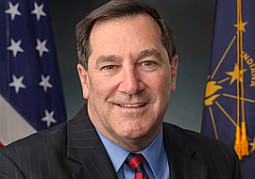Washington, D.C.— The Senate passed the bipartisan House- and Senate-reconciled Comprehensive Addiction and Recovery Act(CARA) Wednesday night that includes several of U.S. Senator Joe Donnelly’s provisions. The final CARA bill would help address the opioid abuse epidemic by giving states and communities tools to prevent and treat drug addiction and support individuals in recovery. The bill includes provisions adopted from Donnelly’s bipartisan legislation to update best prescribing practices and raise public awareness, as well as a bipartisan provision he authored that would encourage first responder units to connect individuals who receive naloxone with treatment or other necessary services.
Donnelly spoke on the Senate floor recently calling for passage of the bipartisan legislation. The bill now heads to President Obama’s desk for his signature.
Donnelly said, “This bipartisan legislation will help save lives and make a difference for families and communities in Indiana and across the nation that are being devastated by the opioid abuse and heroin epidemics. This bill is an important step forward and demonstrates the kind of progress we can make when we work together to confront this public health crisis.”
To see Senator Donnelly speak about CARA recently, click here.
For more than two years, Donnelly has been working to address the opioid abuse and heroin use epidemics in Indiana and across the country. He has listened to Hoosiers, introduced bipartisan legislation, partnered with federal, state, and local officials, and brought together stakeholders. After Donnelly introduced bipartisan legislation with Senator Kelly Ayotte (R-NH) in June 2014that would take a multi-pronged approach to addressing these epidemics, including to update best practices for pain management and prescribing pain medication, Congresswoman Susan Brooks (IN-05) helped introduce similar legislation in the House. Donnelly and Brooks have held two roundtables on the opioid abuse epidemic: the first in September 2015, with federal, state, and local public health officials, doctors, and pharmacists to discuss the role providers play in helping to address the opioid abuse problem; the second in April 2016, with Indiana University School of Medicine (IUSM) doctors, professors, faculty and medical residents, to learn more about IUSM’s efforts to educate and train medical students, residents, and current physicians on best prescribing practices, pain management, substance abuse, and treating addiction. In June 2016, Donnelly held a roundtable in Northwest Indiana focused on drug abuse prevention efforts with federal, state, and local officials to discuss federal and local partnerships and programs that are at work.














